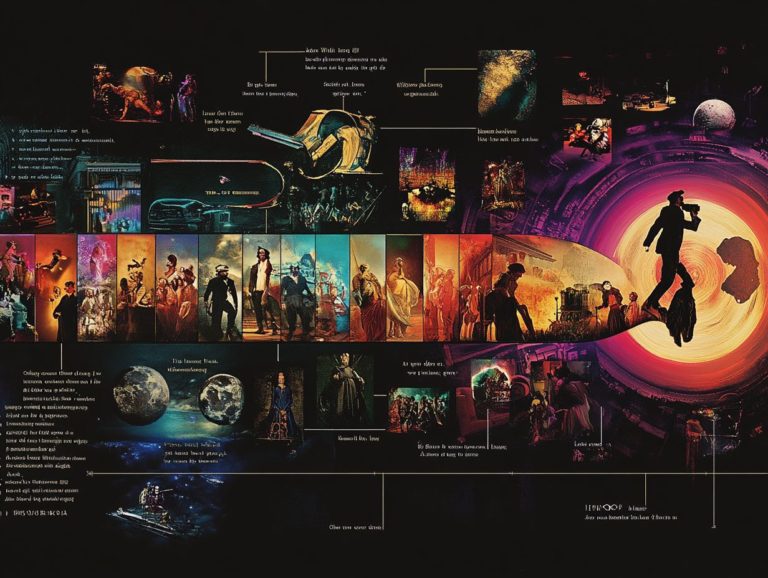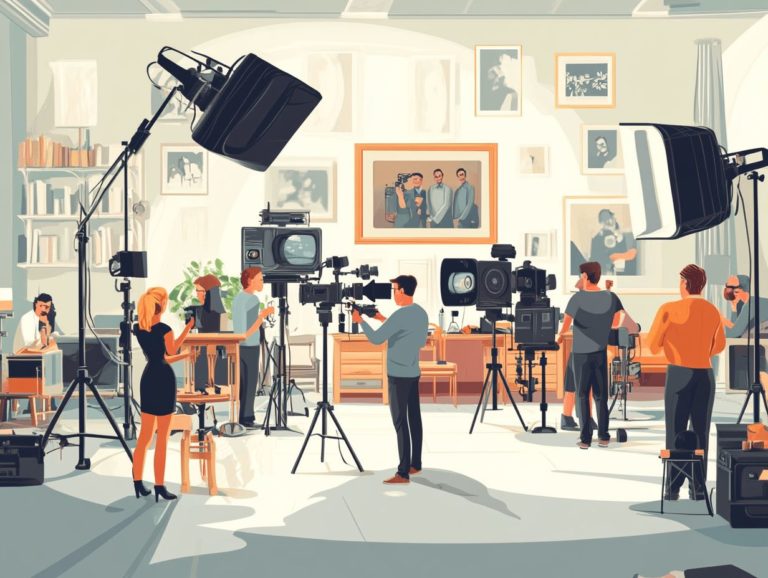5 Ways Copyright Impacts Social Media Influencers
In today s digital landscape, social media influencers find themselves navigating a complex web of copyright laws that can profoundly impact their content creation and brand collaborations.
This piece illuminates five crucial ways copyright affects influencers, ranging from restrictions on the use of copyrighted material to potential legal pitfalls and challenges in monetizing content.
Grasping these elements is vital for maintaining a flourishing online presence. Discover how you can protect yourself, steer clear of infringement, and legally utilize copyrighted material all while fostering creativity and collaboration.
Contents
- Key Takeaways:
- 1. Limits the Use of Copyrighted Material
- 2. Potential for Legal Action
- 3. Difficulty in Monetizing Content
- 4. Can Affect Collaborations with Brands
- 5. Need for Proper Attribution and Permission
- What Is Copyright and How Does It Apply to Social Media Influencers?
- How Can Social Media Influencers Protect Themselves from Copyright Issues?
- What Are the Consequences of Copyright Infringement?
- How Can Social Media Influencers Use Copyrighted Material Legally?
- What Are the Alternatives to Using Copyrighted Material for Social Media Influencers?
- Preguntas Frecuentes
- 1. Qu es el copyright y c mo afecta a los influencers de redes sociales?
- 2. De qu maneras puede afectar el copyright a los influencers de redes sociales?
- 3. Pueden los influencers de redes sociales usar material con copyright sin permiso?
- 4. C mo pueden los influencers de redes sociales obtener permiso para usar material con copyright?
- 5. C mo pueden los influencers de redes sociales evitar la infracci n de copyright?
- 6. Qu deben hacer los influencers de redes sociales si reciben una reclamaci n de copyright?
Key Takeaways:
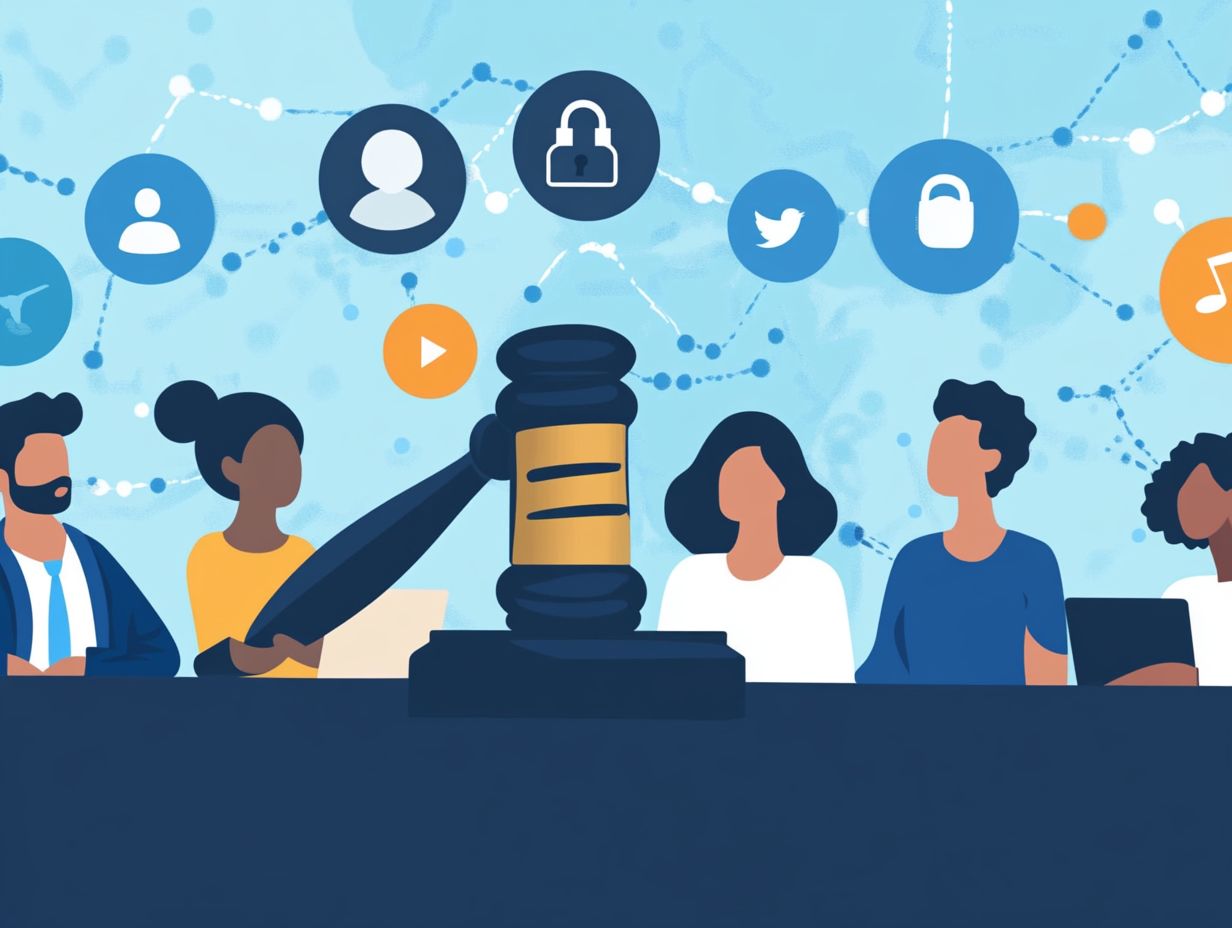
Social media influencers need to be aware of copyright laws and seek proper permission and attribution before using any copyrighted material in their content. Unauthorized use of copyrighted material can result in legal action and damage to an influencer’s reputation and brand partnerships.
Influencers should explore alternative options for creating content, such as creating their own original images and videos, to avoid any potential copyright issues.
1. Limits the Use of Copyrighted Material
In today s digital landscape, social media copyright is an essential consideration for both influencers and brands. By adhering to copyright laws, you can avoid the pitfalls of copyright infringement and the legal headaches that come with it.
Understanding these laws is vital for robust brand protection. They help you comply with the vast sea of user-generated content and intellectual property challenges.
Platforms like Instagram, TikTok, and YouTube have sophisticated systems in place to enforce copyright regulations. They actively monitor content to ensure you secure the necessary licensing permissions before sharing music, images, or videos.
This diligence not only protects the works of creators but also bolsters your integrity as an influencer or brand. A breach could jeopardize your reputation, erode trust among your followers, and ultimately harm your audience engagement.
Do you want to protect your brand? Compliance with these laws is essential! It carries significant weight for your digital marketing strategies. By positioning yourself as an ethical player in a crowded marketplace, you foster a culture of respect for creative ownership, making your brand stand out for all the right reasons.
2. Potential for Legal Action
The potential for legal action due to copyright infringement is a significant concern for you as a social media influencer. Failing to comply with copyright laws can put you at risk of facing big legal problems and lead to costly legal battles.
These legal issues can arise in various forms, including claims for statutory damages that may reach into the thousands. This jeopardizes not only your financial stability but also your reputation in the industry. Understanding copyright law is crucial don t risk your hard work!
Seeking legal advice becomes crucial for effectively navigating the complexities of copyright infringement disputes. Obtaining copyright registration adds a layer of protection, allowing you to take decisive action against unauthorized use of your content.
By adopting proactive measures, such as establishing licensing agreements (contracts that allow you to use someone else’s content legally) and diligently crediting source material, you can significantly reduce your exposure to these legal risks.
3. Difficulty in Monetizing Content
Monetizing content on social media can present a host of challenges, especially when copyright risks threaten your content ownership rights. This can lead to missed opportunities for lucrative influencer collaborations.
When you inadvertently use copyrighted materials be it music, images, or video clips you open yourself up to legal repercussions that could impede your financial success. This complexity demands strategic planning and a dash of creativity in your content creation process.
To effectively navigate these obstacles, focus on producing original content that showcases your unique voice and style. Embracing trending sounds and themes while staying within copyright laws can help you connect with broader trends without the risk of infringement.
Collaborating with other creators to generate user-generated content is a great strategy. It not only helps build a sense of community but also diversifies your content and boosts viewer engagement.
4. Can Affect Collaborations with Brands
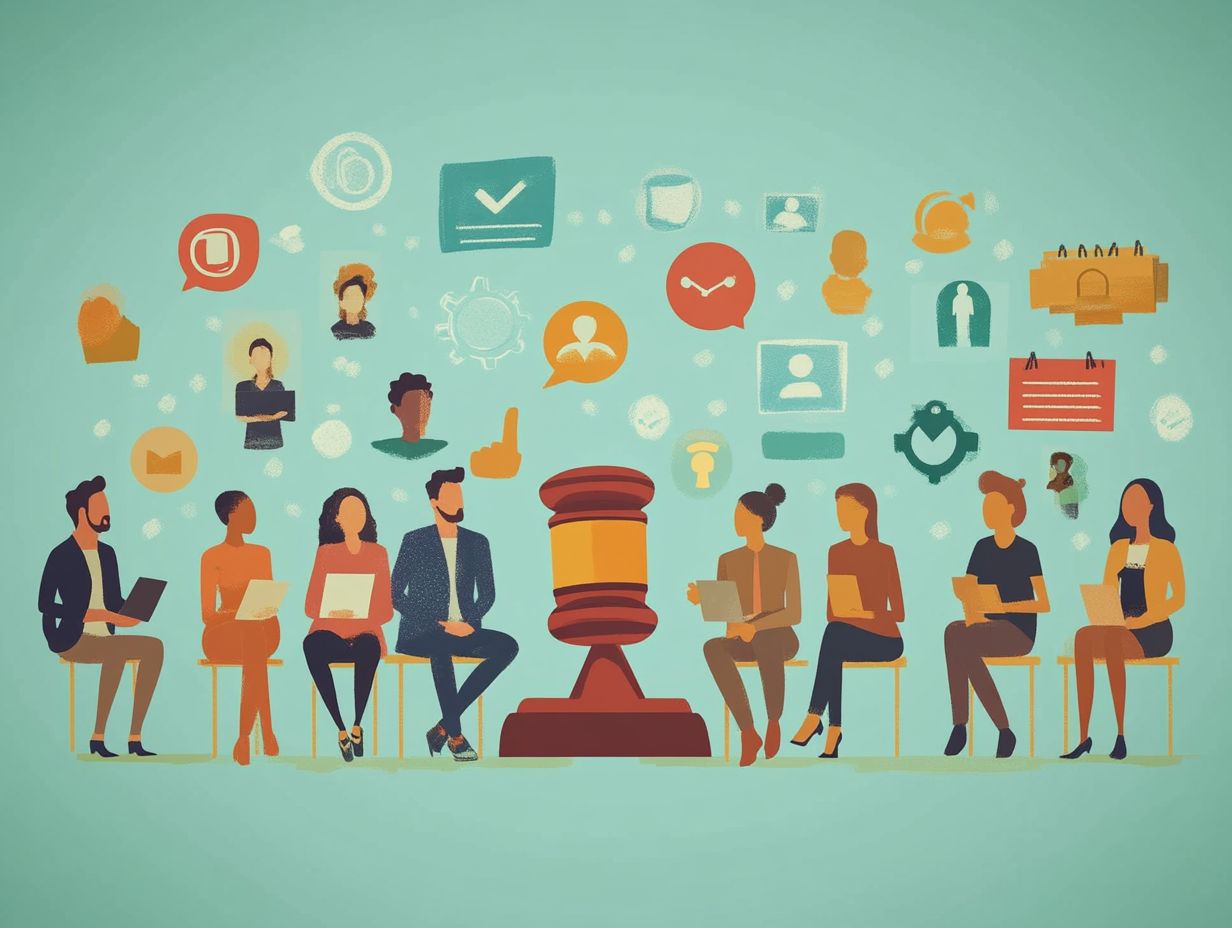
Copyright issues can greatly influence your collaborations with brands. As brands strive to protect their values and creative work, they adopt strict social media strategies that involve thorough approval workflows and adherence to copyright laws.
Today, brands are more cautious than ever when evaluating potential partnerships with creators. They carefully scrutinize your content for signs of copyright infringement or misaligned messaging. This thorough evaluation is crucial for mitigating risks. A single violation could lead to legal troubles, reputational damage, and financial setbacks.
Establishing clear influencer agreements is essential. These agreements outline expectations, rights, and responsibilities regarding copyright compliance. They safeguard a brand’s assets while fostering a transparent working relationship, ensuring that both you and the brand align on creative direction and copyright considerations.
A well-defined partnership allows for collaboration that is both innovative and legally sound.
5. Need for Proper Attribution and Permission
The importance of proper attribution and obtaining licensing permissions is critical for social media influencers. Ignoring fair use principles could lead to copyright infringement and harm your credibility.
When you understand and follow content attribution guidelines, you not only protect yourself from potential legal disputes but also build trust with your audience and fellow creators. Respecting copyright laws and acknowledging original creators is vital for maintaining an ethical online community.
By utilizing fair dealing provisions, you can source material ethically without infringing on the rights of those you borrow from, ensuring that original creators receive the recognition they deserve. This approach fosters a harmonious and respectful digital landscape, where creativity can thrive, benefiting not just you as an influencer but the wider community of content creators.
What Is Copyright and How Does It Apply to Social Media Influencers?
Copyright is a form of creative work that grants you exclusive rights to your original content. This is especially crucial for social media influencers as you navigate the complex web of copyright laws while creating digital content across platforms like Instagram, TikTok, and YouTube.
This legal framework protects your creative efforts and allows you to engage confidently in brand collaborations without stepping on anyone else’s toes. Grasping how copyright affects your content is vital for your success!
The implications of copyright go beyond mere compliance; they can significantly influence the financial outcomes of your influencer marketing campaigns. By respecting copyright laws, you build trustworthy relationships with brands, propelling the creator economy forward while maximizing your growth and revenue potential.
What Are the Different Types of Copyright Infringement?
Understanding the various types of copyright infringement is essential for you as a social media influencer. This knowledge equips you to navigate the legal intricacies of using third-party content without proper licensing agreements and clarifies the boundaries of fair use and fair dealing.
By distinguishing between direct infringement using content without authorization and indirect infringement, where you might inadvertently facilitate someone else’s infringement, you can better protect yourself from potential legal issues.
To reduce risks, diligently adhere to licensing agreements and invest time in understanding the nuances of fair use, especially regarding transformative works or user-generated content.
This commitment fosters a respectful content creation environment and enhances your reputation, allowing you to build trust with your audience.
Ready to delve deeper into copyright compliance? Review your content practices today to ensure you’re on the right track!
How Can Social Media Influencers Protect Themselves from Copyright Issues?
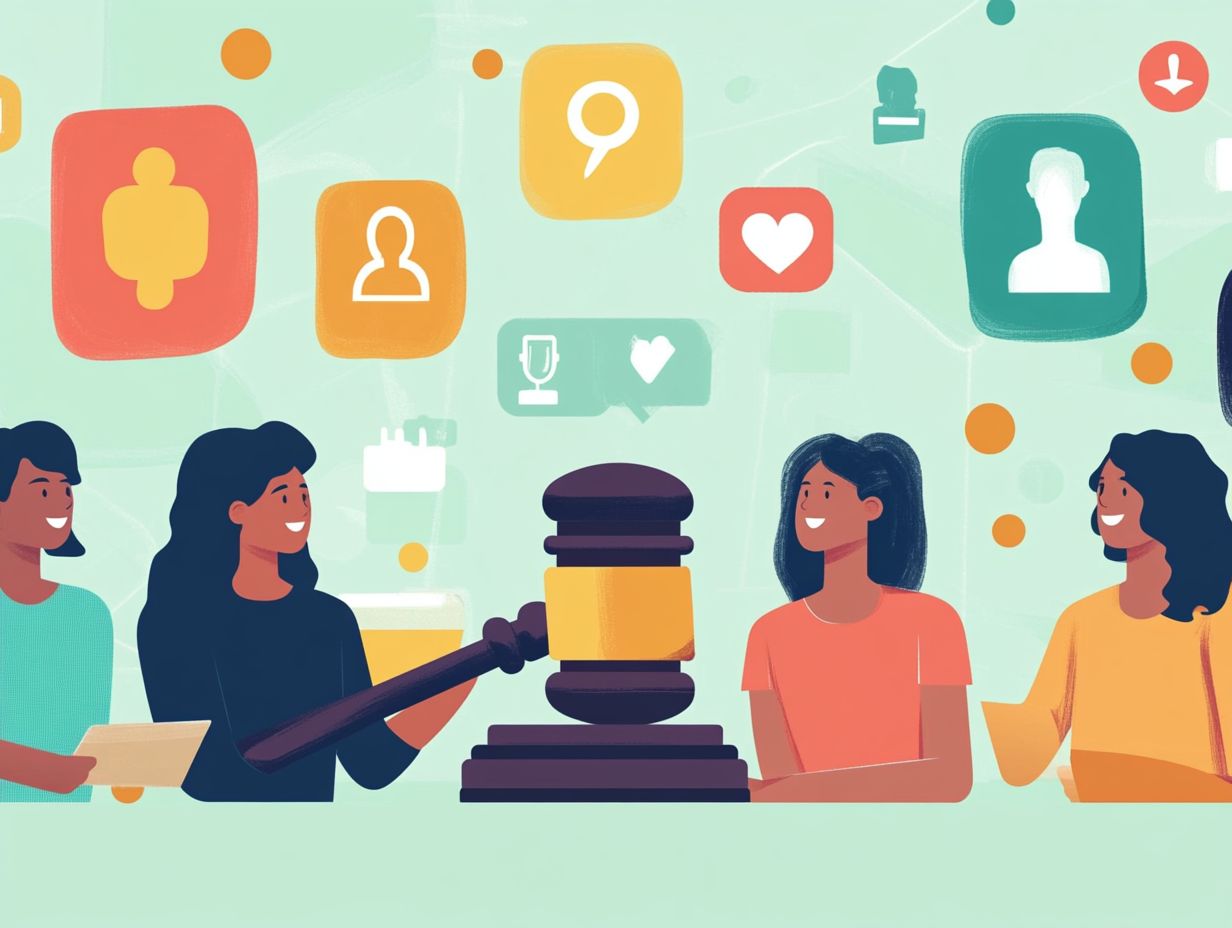
Social media influencers can take several proactive steps to protect themselves from copyright issues.
Consulting a legal team is essential to understand compliance requirements.
Obtaining licensing permission for any third-party content used is imperative. This provides legal protection against potential infringements.
By registering copyright for original work, influencers can solidify their ownership and defend their creative outputs.
Creating a comprehensive social media policy is also beneficial. It clearly defines content ownership and attribution standards, setting transparent expectations for collaborations and guest contributions.
By embracing these practices, influencers shield themselves from legal pitfalls. They also cultivate a professional environment that honors intellectual property rights.
What Are the Consequences of Copyright Infringement?
The consequences of copyright infringement can be severe, ranging from financial penalties to potential lawsuits. These issues can significantly impact your brand reputation and financial stability.
Beyond immediate financial penalties, you might face the loss of collaborative opportunities and a decline in audience trust.
As an influencer, your marketability relies on partnerships and sponsorships. Legal challenges may lead brands to reconsider associating with you if you are viewed as a risk.
To navigate these pitfalls, it s crucial to understand copyright laws, secure proper licenses for all content you use, and implement robust strategies for content distribution.
Take these steps now to build a strong and legally safe online presence while safeguarding your creative integrity and financial wellbeing.
How Can Social Media Influencers Use Copyrighted Material Legally?
As a social media influencer, you can use copyrighted material legally by following established guidelines.
This includes obtaining licensing agreements and understanding the principles of fair use to avoid copyright infringement.
For instance, if you want to feature a popular song in your video, it’s essential to secure a licensing agreement that grants you the rights to use that music. This usually means working out an agreement with the copyright owner, which might involve a fee or revenue-sharing arrangement.
Familiarizing yourself with fair use is crucial. It allows for limited use of copyrighted material without permission, as long as it s transformative and doesn t harm the marketability of the original work.
Navigating these legal waters may seem complex, but by paying close attention to the rules and maintaining communication with rights holders, you can incorporate copyrighted material while staying compliant.
What Are the Alternatives to Using Copyrighted Material for Social Media Influencers?
For social media influencers, exploring alternatives to copyrighted material is crucial for crafting unique, original content.
This approach nurtures creativity and enhances your brand identity while staying compliant with copyright laws.
One effective strategy is to leverage user-generated content. Invite your followers to share their own experiences with a brand or product. This enriches your content pool and fosters a sense of community among your audience.
Collaborating with fellow influencers can also provide fresh perspectives. Create co-branded content that resonates with both follower bases.
By focusing on these strategies, you can boost audience engagement and loyalty while sidestepping legal pitfalls.
Preguntas Frecuentes
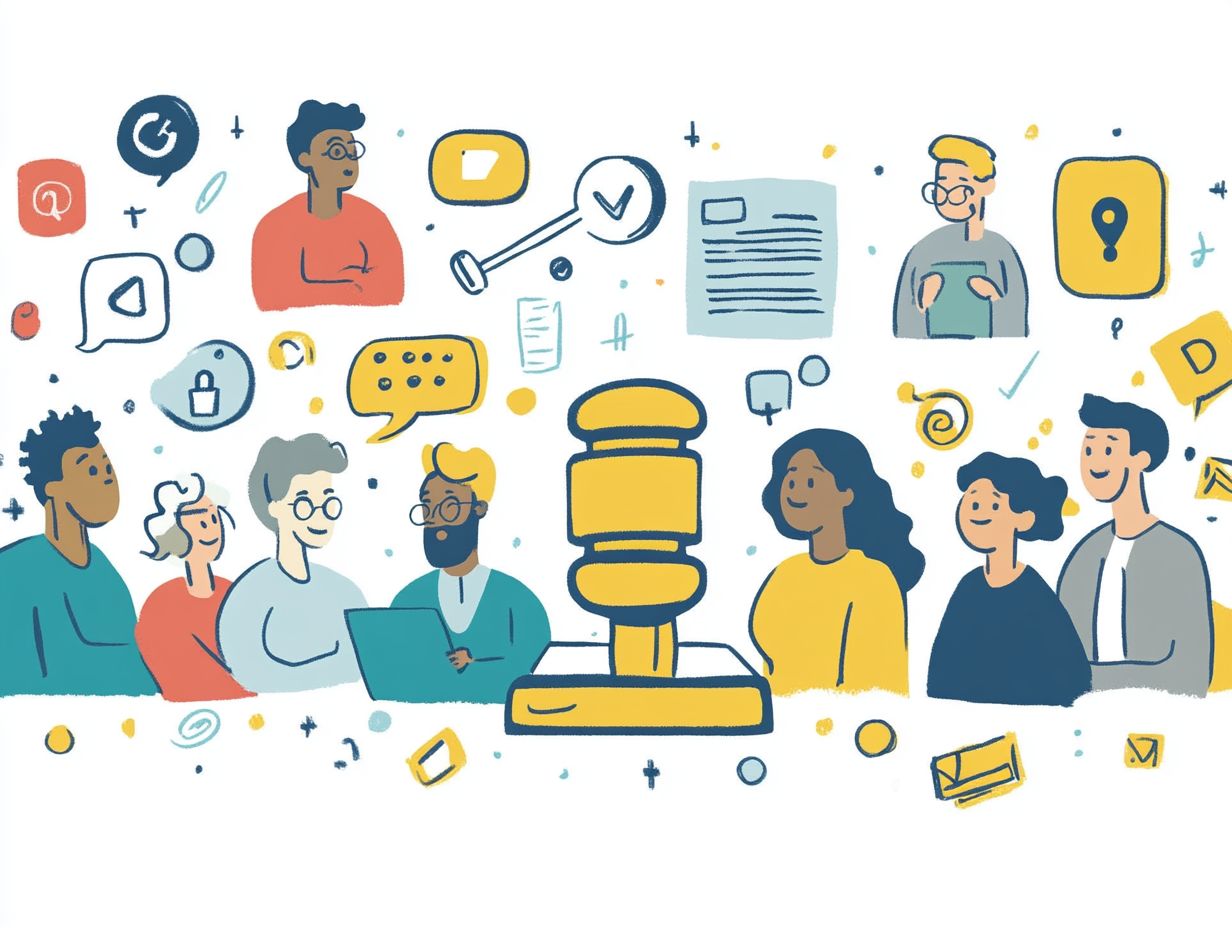
El copyright es una ley que protege los derechos de los creadores sobre sus obras originales, como arte y m sica. Para los influencers, esto significa que deben pedir permiso antes de usar el trabajo de alguien m s.
El copyright puede afectar a los influencers de varias maneras. Esto incluye usar material sin permiso, obtener permisos, evitar infracciones y crear contenido original.
No, no pueden. Usar im genes, m sica o videos de otros sin permisos adecuados es una infracci n y puede llevar a acciones legales.
Para obtener permiso, los influencers deben contactar al propietario del copyright y solicitar una licencia. A veces, esto implica pagar una tarifa o dar cr dito al creador original.
Para evitar problemas de copyright, los influencers deben usar solo su propio contenido o asegurarse de tener las licencias necesarias. Tambi n es importante conocer las leyes de uso justo.
Si reciben una reclamaci n, deben actuar r pidamente. Pueden eliminar el contenido cuestionado o demostrar que tienen permiso para usarlo. Ignorar la reclamaci n puede llevar a la suspensi n de su cuenta.



